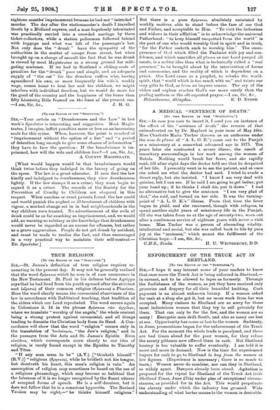ere THY EDITOR OF THZ "SPECTATOR."] SIR,—Your article on "
Drunkenuess and the Law" in last week's Spectator is interesting and suggestive. Most Magis- trates, I imagine, inflict penalties more or less on an increasing scale for this crime. When, however, the point is reached of "imprisonment without the option of a fine" and "a period of detention long enough to give some chance of reformation" they have to face the question : If the breadwinner is im- prisoned, how will the wife and children live P—I am, Sir, &c., A COUNTY MAGISTRATE.
[What would happen would be that breadwinners would think twice before they indulged in the luxury of going on the spree. The law is a great educator. If men find the law kindly and indulgent to drunkenness, they view drunkenness lightly. If the law stamps it as a crime, they soon begin to regard it as a crime. The records of the Society for the Prevention of Cruelty to Children are eloquent in this respect. When careless or cruel parents found the law could and would punish the neglect or ill-treatment of children with vigour, a marked change set in in bad neigh born-hoods in the way children were treated. No advertisement of the evils of drink could be so far-reaching as imprisonment, and, we would add, no warning so salutary as the knowledge that drunkenness would never be regarded as an excuse for offences, but rather as a grave aggravation. People do not get drunk by accident, and must be made to realise the fact, and thus encouraged in a very practical way to maintain their self-control.— ED. Spectator.]






































 Previous page
Previous page